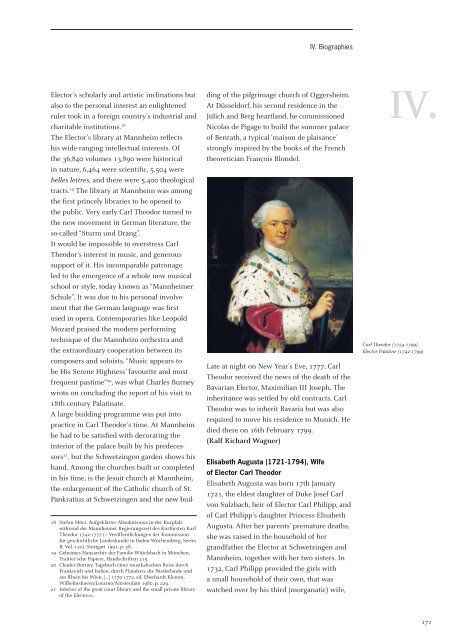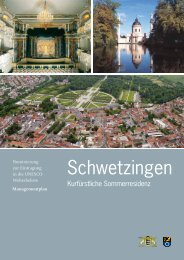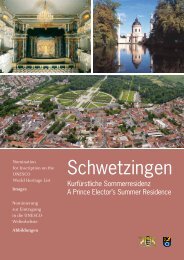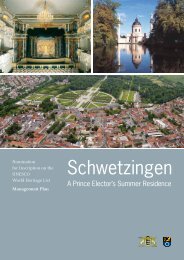II. - Schloss Schwetzingen
II. - Schloss Schwetzingen
II. - Schloss Schwetzingen
Create successful ePaper yourself
Turn your PDF publications into a flip-book with our unique Google optimized e-Paper software.
Elector’s scholarly and artistic inclinations but<br />
also to the personal interest an enlightened<br />
ruler took in a foreign country’s industrial and<br />
charitable institutions. 18<br />
The Elector’s library at Mannheim refl ects<br />
his wide-ranging intellectual interests. Of<br />
the 36,840 volumes 13,890 were historical<br />
in nature, 6,464 were scientifi c, 5,504 were<br />
belles lettres, and there were 5,400 theological<br />
tracts. 19 The library at Mannheim was among<br />
the fi rst princely libraries to be opened to<br />
the public. Very early Carl Theodor turned to<br />
the new movement in German literature, the<br />
so-called “Sturm und Drang”.<br />
It would be impossible to overstress Carl<br />
Theodor’s interest in music, and generous<br />
support of it. His incomparable patronage<br />
led to the emergence of a whole new musical<br />
school or style, today known as “Mannheimer<br />
Schule”. It was due to his personal involvement<br />
that the German language was fi rst<br />
used in opera. Contemporaries like Leopold<br />
Mozard praised the modern performing<br />
technique of the Mannheim orchestra and<br />
the extraordinary cooperation between its<br />
composers and soloists. “Music appears to<br />
be His Serene Highness’ favourite and most<br />
frequent pastime“ 20 , was what Charles Burney<br />
wrote on concluding the report of his visit to<br />
18th-century Palatinate.<br />
A large building programme was put into<br />
practice in Carl Theodor’s time. At Mannheim<br />
he had to be satisfi ed with decorating the<br />
interior of the palace built by his predecessors<br />
21 , but the <strong>Schwetzingen</strong> garden shows his<br />
hand. Among the churches built or completed<br />
in his time, is the Jesuit church at Mannheim,<br />
the enlargement of the Catholic church of St.<br />
Pankratius at <strong>Schwetzingen</strong> and the new buil-<br />
18 Stefan Mörz, Aufgeklärter Absolutismus in der Kurpfalz<br />
während der Mannheimer Regierungszeit des Kurfürsten Karl<br />
Theodor 1742-1777 (= Veröffentlichungen der Kommission<br />
für geschichtliche Landeskunde in Baden-Württemberg, Series<br />
B, Vol. 120), Stuttgart 1991, p. 58.<br />
19 Geheimes Hausarchiv der Familie Wittelsbach in München,<br />
Traitter’sche Papiere, Handschriften 215.<br />
20 Charles Burney, Tagebuch einer musikalischen Reise durch<br />
Frankreich und Italien, durch Flandern, die Niederlande und<br />
am Rhein bis Wien, […] 1770-1772, ed. Eberhardt Klemm,<br />
Wilhelmshaven/Locarno/Amsterdam 1980, p. 229.<br />
21 Interior of the great court library and the small private library<br />
of the Electress.<br />
IV. Biographies<br />
ding of the pilgrimage church of Oggersheim.<br />
At Düsseldorf, his second residence in the<br />
Jülich and Berg heartland, he commissioned<br />
Nicolas de Pigage to build the summer palace<br />
of Benrath, a typical ‘maison de plaisance’<br />
strongly inspired by the books of the French<br />
theoretician François Blondel.<br />
Late at night on New Year’s Eve, 1777, Carl<br />
Theodor received the news of the death of the<br />
Bavarian Elector, Maximilian <strong>II</strong>I Joseph. The<br />
inheritance was settled by old contracts. Carl<br />
Theodor was to inherit Bavaria but was also<br />
required to move his residence to Munich. He<br />
died there on 16th February 1799.<br />
(Ralf Richard Wagner)<br />
Elisabeth Augusta (1721-1794), Wife<br />
of Elector Carl Theodor<br />
Elisabeth Augusta was born 17th January<br />
1721, the eldest daughter of Duke Josef Carl<br />
von Sulzbach, heir of Elector Carl Philipp, and<br />
of Carl Philipp’s daughter Princess Elisabeth<br />
Augusta. After her parents’ premature deaths,<br />
she was raised in the household of her<br />
grandfather the Elector at <strong>Schwetzingen</strong> and<br />
Mannheim, together with her two sisters. In<br />
1732, Carl Philipp provided the girls with<br />
a small household of their own, that was<br />
watched over by his third (morganatic) wife,<br />
IV.<br />
Carl Theodor (1724-1799),<br />
Elector Palatine (1742-1799)<br />
171






